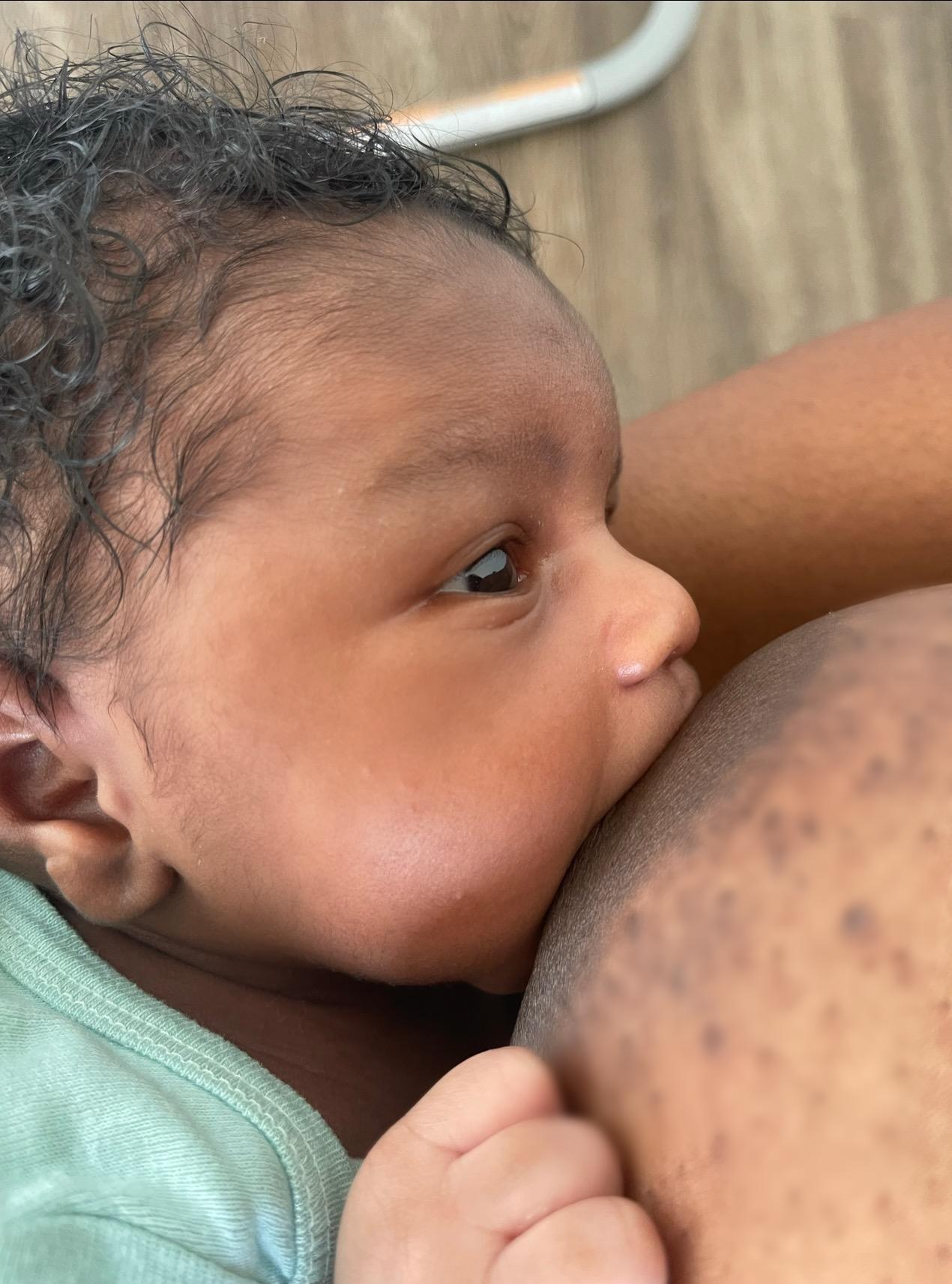August is National Breastfeeding Month. It is a time to celebrate and raise awareness. Though breastfeeding is highly regarded across cultures, Black mothers have challenges and experiences worth highlighting. For over ten years, this week has amplified the struggles of Black moms. This article serves as a vehicle to share why Black Breastfeeding Week should matter to all of us.

The Strenuous Relationship With Black Moms and Physicians
The history of the Western medical field and Black women is long and hard. From the history of early OBGYNs experimenting on enslaved women to forced sterilization to higher C-section rates, Black mothers often find themselves unsupported, and their pain and concerns minimized in medical settings. Thus, there should be no surprise that when Black moms seek help for breastfeeding, they might experience some challenges. Anectodal and quantitative data tells us that Black mothers often are given less access to a lactation specialist and encouraged to formula feed. Quality care for Black moms should be the norm, not the exception.
Racism impacts care. Just a year ago, while receiving support from the hospital’s lactation consultant, I recall her five minutes of support, including her just handing me a nipple shield without giving instructions. Maybe the hospital staff was stretched thin, and she was in a rush to see the next patient, but her support was minimal. I remember feeling it did not matter to her whether I breastfed or not – this is just one of the countless stories of how Black women are disregarded and treated as an afterthought.
Data Tells Us This Deserves Our Attention
Although rates of breastfeeding initiation have increased during the past decade, racial/ethnic disparities in breastfeeding persist. According to the CDC, In 26 states (including DC), the breastfeeding initiation rate was lowest among infants of Black mothers. The infant mortality rate for Black babies is double that of white babies. Sick and premature babies would benefit the most from breastmilk’s nutritional and immunity-boosting powers. According to the CDC, increased breastfeeding among black women could decrease infant mortality rates by as much as 50%. That’s huge and would make a difference for so many families.
Economic Inequity and Access
The Black women’s pay gap is a serious problem. When we think about why this matters for Black women and breastfeeding, black moms often don’t have the luxury to take off work for long periods during postpartum; working and breastfeeding is a challenge for any mom. The demand of keeping up your supply while away at work often is a significant barrier to a mom continuing to breastfeed.
Additionally, some lactation services are not covered by insurance. I’d taken some online lactation courses covered by insurance, but I had to pay out of pocket if I needed an in-person visit, which I did. I had medical bills piling up and was on non-paid maternity leave; I couldn’t afford the two-hundred dollars it would take for the visit. Thankfully, my two girlfriends paid the fee for me. Many Black moms may not have a community or the economic freedom to get the help necessary to breastfeed. Thankfully many organizations are attempting to close the education gap around breastfeeding by offering free courses.
Diversity Matters Among Lactation Consultants
I took several breastfeeding courses before my son’s arrival, and all the women teaching the classes were white. My doula (a Black woman) referred me to a Black lactation consultant. She was, however, one of two Black consultants with the local organization I used. Representation matters in every field. More Black lactation consultants could translate to more Black moms feeling seen and their concerns adequately addressed. My lactation consultant helped me identify that my son had a tongue and a lip tie, which often are severe barriers to children latching. Her care made all the difference.

The Well-being of Black Mothers Matters
Breastfeeding for many mothers can be a stressful feat. Every mother, across racial and economic status, will agree that those first few weeks of postpartum are rough. Your body is in recovery; you’re sleep deprived, and you have a whole new human who depends on you for everything. Add to that the stress of trying to learn/master breastfeeding. Statistically, and I might add often, due to many factors including societal pressures, Black moms experience postpartum depression at higher rates. Raising awareness by sharing resources, encouraging communal support, and being mindful of barriers only contributes to the mother’s well-being. Her well-being matters because it impacts the care she provides to her little one. Consider ways to contribute to a Black mom’s well-being, especially if she is first-time mom or has recently given birth.
Black Women Innovate, and It’s Often Because We’ve Had to
Krystal Duhaney, founder of Milky Mama, a registered nurse, was shocked by the lack of support she received as a first-time mom. She developed a recipe to increase her milk supply and started Milky Mama. Events such as the annual District Motherhued’s Boobs In The Park are how Black mothers cultivate a community and normalize breastfeeding. Black women are each other’s most prominent advocates. We’ve had to be, and still, allies are essential. It has been wonderful to see all the organizations amplify Black breastfeeding week. While our experiences differ, solidarity in motherhood is rich and furthers equity for all moms.
Every Mother’s Journey Matters
Every mother’s breastfeeding journey is different and is worthy of celebration. Amplifying the barriers and unique experiences of Black moms opens doors to acknowledging the varied experiences all moms face. I’m celebrating thirteen months of pumping. I met lactation specialists, took courses, and in the end, my son never consistently latched. Determined to ensure he was fed breastmilk exclusively in his first months, I pumped every three hours and gave him breastmilk via the bottle. I set out thinking it might last six months. Here I am, almost thirteen months later, still pumping strong.
Breastfeeding is challenging. Period. It isn’t an easy feat. Whether you decided not to breastfeed for your mental health, were sorely disappointed that the baby wouldn’t latch, or was just too overwhelmed, you did what was best, and you deserve appreciation. For my breastfeeding moms, whether a couple of months or a year or more, however long you choose to do it, congratulations, mama!














